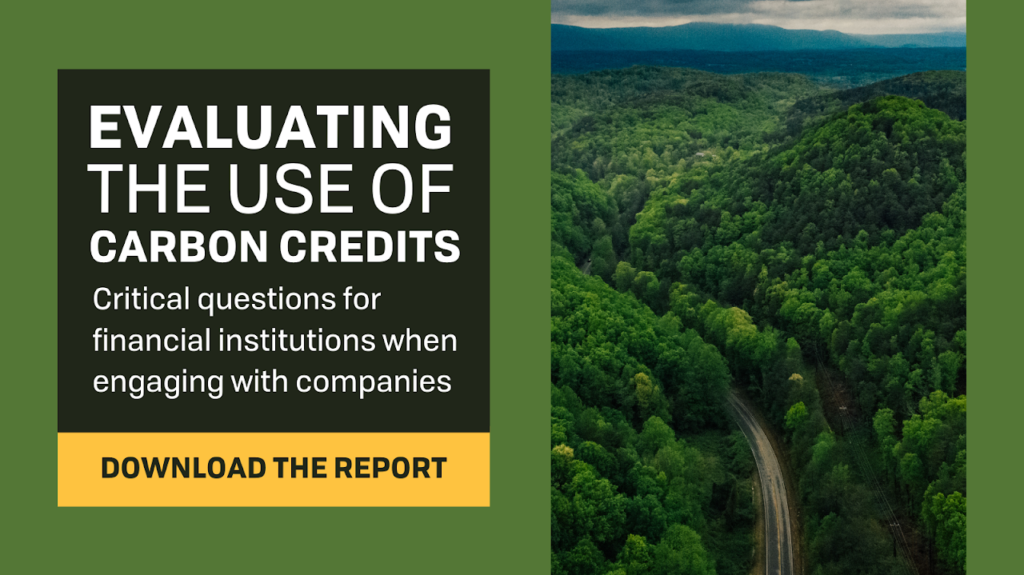Last updated on February 2nd, 2024
The new report from the Intergovernmental Panel on Climate Change report underscores a stark reality: that we must urgently pursue all our options to cut emissions and remove carbon from the atmosphere if we have any hope of avoiding the worst impacts of the climate crisis.
Carbon credits have a clear but limited role to play in reducing this existential risk to our planet. When used to raise the ambition of climate commitments — and not to replace ambitious emission reduction goals — carbon credit projects, especially those that protect, improve, and restore natural and working lands, can make an important contribution to meeting the goals of the Paris Agreement.
The interest in carbon credit programs is rising – last year, the total value of the voluntary market hit $1 billion. The potential of such projects to meaningfully contribute to mitigating climate change depends substantially on whether they contribute to sustainable communities and resilient ecosystems.

As new analysis from Ceres lays out, carbon credit projects that are designed with the full participation of communities they impact and that implement key safeguards are more likely to be sustained and meaningfully contribute to emission reductions and carbon sequestration over the long term. It is critical that companies follow strict guardrails not only for when they use credits, but for what types of credits they purchase—so that they contribute to more sustainable communities and resilient ecosystems, rather than leading to land grabs or restricting access to critical resources. These critical safeguards can help strengthen participation, improve the distribution of benefits and burdens, enhance cultural and political recognition, and enhance project longevity:
- Upholds the rights of Indigenous Peoples, local communities, and Afro-descendent peoples. Projects should ensure that they are recognizing and upholding the sovereignty, governance structures, and right to self-determination of Indigenous Peoples, local communities, and Afro-descendant Peoples.
- Secures land tenure and access. Projects should not encroach on land where customary rightsholders have not granted approval to access. Communities should also be able to maintain access to land because it constitutes the basis for accessing food, housing, water, and development, as well as traditional, cultural, and sacred practices and ways of life.
- Incorporates full and effective community participation. All affected parties should have access to resources necessary to have informed conversations about the project. Effort should be made to have equitable participation by all community members, including women, youth, ethnic minorities, religious minorities, and other marginalized groups. Rightsholders should give free, prior, and informed consent of the project.
- Has a grievance and redress mechanism. Projects must include specific, formalized procedures that local communities can use to address any disputes that might arise during the planning, implementation, and evaluation of a project.
These are just a few of the safeguards identified in Ceres’ report that prevent undesirable outcomes and ensure that people are at the center of climate solutions. Certification programs can help ensure that carbon projects address the above safeguards. Companies should purchase credits that are certified by one of the social and environmental standards and conduct due diligence as needed.
Done right, carbon credit projects have the potential to both reduce emissions and empower communities. But done wrong, they can make the situation worse for populations already vulnerable to climate change, as well as actually exacerbate the climate crisis. The stakes for getting carbon credit projects right are only going to keep rising.
Companies are already under increased pressure from consumers and employees to reverse the trend of injustice towards historically marginalized communities, including low-income and fence line communities, people of color, Indigenous communities, and others across the Global South. Understanding these issues and how to navigate them is the only way carbon credit projects will be able to meaningfully contribute to meeting the goals of the Paris Agreement.
Carolyn Ching is Ceres’ Senior Manager of Food & Forests, and is a member of the U.S. Nature4Climate steering committee.
